
views
X
Research source
Restructuring Your Daily Routine
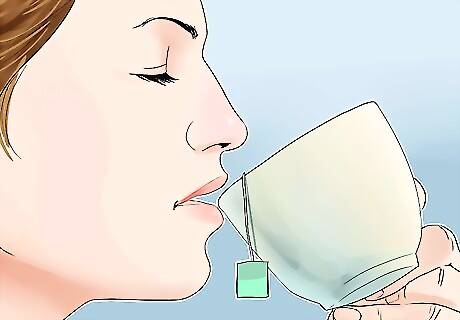
Begin each day by drinking a natural diuretic. Caffeinated beverages, such as coffee and tea, are natural diuretics—they stimulate your colonic muscles, causing them to contract. These contractions help your body flush water and waste products out of your system. In addition to regulating your system, drinking 1 to 2 cups of coffee or tea in the morning or over the course of the day will also help you to feel less bloated.
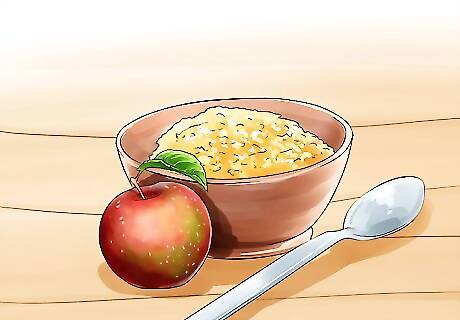
Have a healthy mid-morning snack. While some people grab a sugary or fatty pick-me-up snack in between meals, others opt not to snack. Neither option, however, is conducive to losing weight. If you are a snacker, swap that tempting sugary, salty, or fatty snack, with a healthy snack that will sustain you until lunch. If you prefer not to eat between meals, you are more likely to binge at mealtime. To prevent overeating at lunch, consider adding a healthy mid-morning snack that will curve your appetite. Healthy snack options include a piece of whole fruit, a cup of yogurt, or a small bowl of oatmeal.
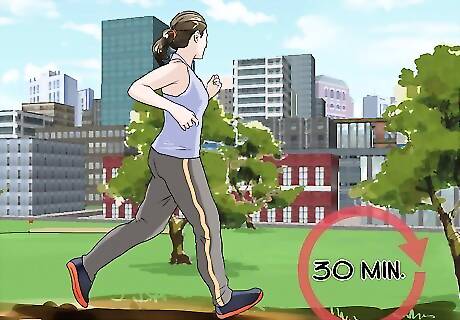
Do a 30 minute cardio workout. Cardio exercise benefits your body in a number of ways. First, when we exercise, we sweat. Sweating is an easy and efficient way of ridding your body of excess water weight. Second, exercise boosts your metabolism. When your metabolic rate is increased, you burn more fat and rid your body toxins that cause you to retain water. Lastly, physical activity is an excellent way to reduce stress. When you feel stressed, you may overeat, retain water, or store more fat than is needed. Aim to workout for approximately a half hour each day. You can walk, bike, run, swim, or take an exercise class. Consider working out 2 to 3 hours before bed. Since your metabolic rate will be higher, you will burn fat throughout the night.
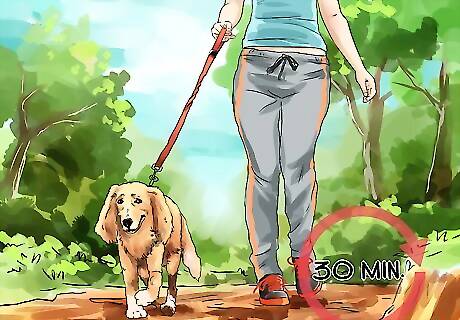
Take 30 minutes to de-stress each day. When you are stressed, your body releases the hormone cortisol. Cortisol is released when your body is physically stressed and or emotionally stressed. This hormone causes your body to store additional fat and water. By reducing your stress level, you can reduce the presence of cortisol in your system, and in turn begin to lose weight. The following activities may help you to unwind: Exercise. Take a brisk walk. Yoga and or meditation. Listen to your favorite music. Take a bath. Get a massage.
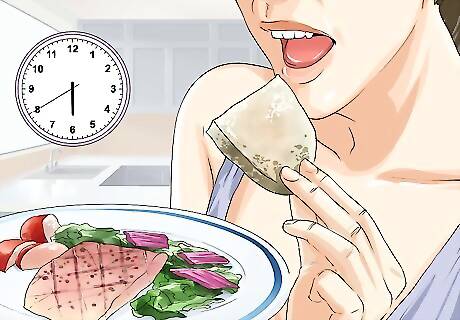
Eat dinner early. After consuming a meal, your body has to digest the food. The digestion process can cause you to become bloated. As a result, if you force your body to digest food while you sleep, you may struggle to lose weight overnight. To avoid going to bed bloated, consume your dinner several hours before you go to sleep.
Restructuring Your Nighttime Routine

Take an epsom salt bath 2 to 3 times a week. Epsom salt naturally flushes your body of toxins and excess water that cause you to bloat. Soaking in an epsom salt bath before bed will help you achieve your goal of losing weight overnight. Fill your bathtub with warm water and mix in 2 cups (500 ml) of Epsom salt. Soak in the bath for 15 minutes, and repeat this routine two or three times each week.

Drink green tea before bed. Prior to falling asleep, make yourself a nice warm cup of green tea. Green tea, a natural diuretic, helps to boost your metabolism. When imbibed before bed, this warm, soothing liquid will help you burn fat more efficiently throughout the night.
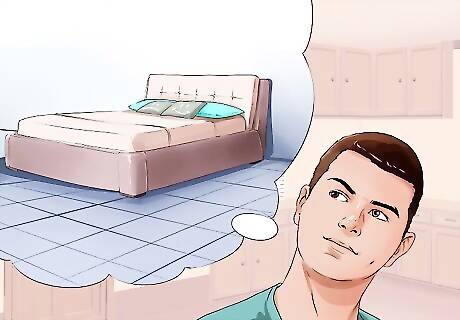
Create a calming sleep environment. In order to lose water and carbon weight throughout the night, you must be asleep. To ensure that you will fall asleep quickly and remaining slumbering throughout the night, transform your bedroom into an environment that is conducive to sleep and weight loss. Turn down the temperature in your bedroom to 66℉. When you sleep in a cold room, your body is forced to burn its stores of fat for warmth.
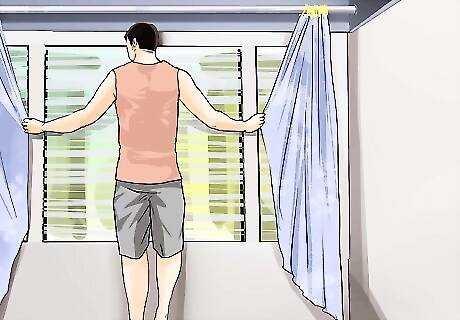
Limit exposure to light. Exposure to light at night may not only prevent you from getting a great night of sleep, but it can also cause you to gain weight. You can limit your exposure to unnecessary light by covering your windows with blackout curtains, removing any night lights from your room, turning off your T.V., computer, and tablet, and setting your phone aside.
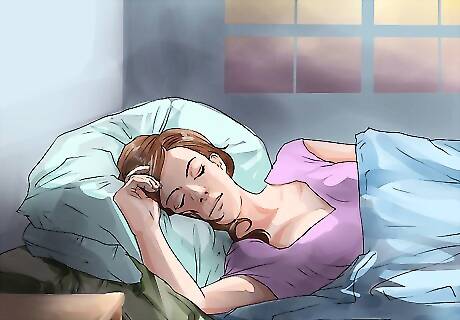
Get plenty of sleep. Sleeping regulates your body's hormones that dictate when and how much you eat and it improves increases your metabolic rate. As you sleep, you also lose up to 2 pounds of water and carbon weight through your breath. The average adult needs 7-1/2 hours of sleep each night. If you aren't getting 7 to 8 hours of sleep, alter your schedule to allow for this amount of slumber. If you already get at least 7 hours of sleep each night, you may not notice much difference in your weight if you increase this amount by 30 to 60 minutes. If you're more severely sleep deprived, you should find it easier to shed weight once you start sleeping more.
Altering Your Diet
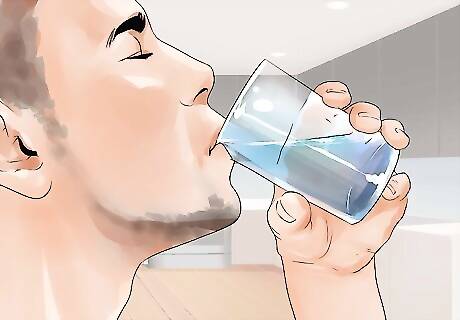
Drink more water. When your body is dehydrated, it is more likely to retain water. Therefore, in order to shed excess water weight overnight, you must drink the recommended amount of water during the day. The average man needs to drink 3 liters of water each day. The average woman needs to drink 2.2 liters of water each day. Avoid large amounts of caffeine and alcohol since both substances can dehydrate your body. Other beverages can help you remain adequately hydrated, but you should avoid drinking too many sugary beverages or drinks that are otherwise high calories.
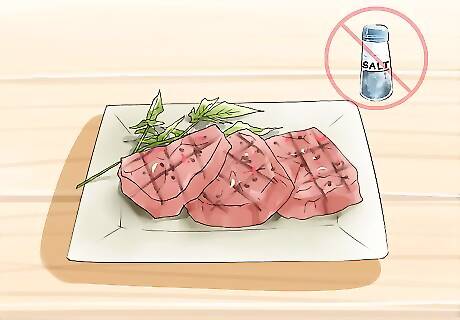
Reduce your sodium intake. When you consume a diet high in sodium, your body will retain water. The excess water may cause your stomach to bloat and your waist size to increase. In order to decrease your sodium intake, avoid: Foods that taste salty. Adding salt to your food. Foods do not taste salty, but contain hidden sodium. These may include canned food, processed meats, and frozen meals.
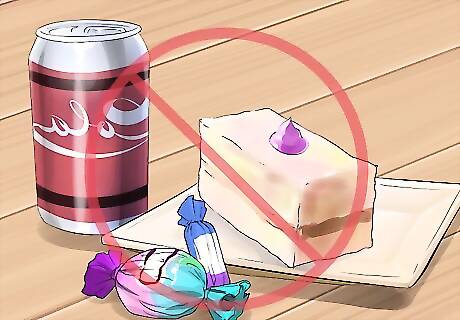
Limit your sugar intake. A diet high in sugar increases your body’s storage of fat. Throughout the day avoid sugary foods and beverages. These include: Candies, sweets, and desserts Fruit juices Sodas Alcoholic beverages
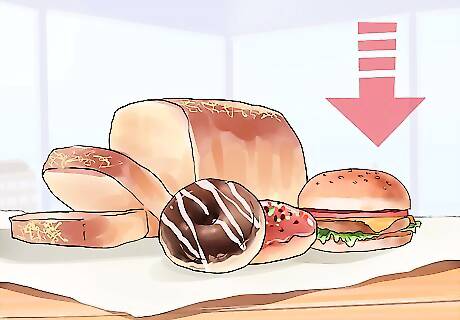
Reduce your carb intake. As your body digests carbohydrates, the each gram of carbs retains approximately 4 grams of water. Once the digestion process is complete, the body stores carbs as sugars and fats. In order to reduce the amount of water your body retains, as well as the amount of fats and sugars it stores, you can limit your intake of carbohydrates. When you go on a safe, low-carb diet, you can lose around 10 pounds of water weight.
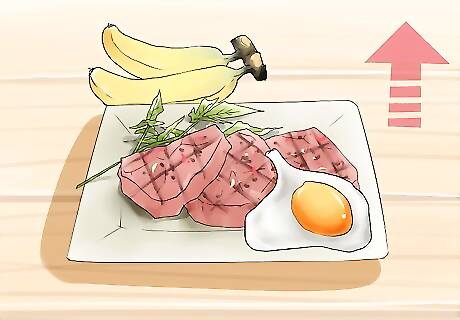
Increase your consumption of protein, fiber, and potassium. In an effort to lose weight, especially if you want to do so without developing loose skin, swap your sugary snacks or carb-loaded meals with items high in protein, fiber, and potassium. Foods rich in protein, such as meats and legumes, promote muscle building and increase your metabolic rate. Items high in fiber, such as leafy greens and whole grains, and potassium, such as bananas and peanut butter, help your body to burn fat and lose excess water.


















Comments
0 comment